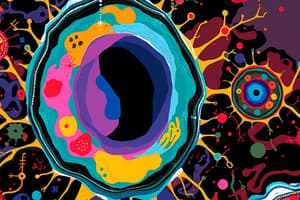Podcast
Questions and Answers
What serves as the cooling system to remove excess heat in the body?
What serves as the cooling system to remove excess heat in the body?
Perspiration
What is the definition of homeostasis?
What is the definition of homeostasis?
An organism's ability to keep a constant internal state.
What is chemical energy stored in?
What is chemical energy stored in?
Bonds present in food molecules.
Which cells need energy to perform their functions? (Select all that apply)
Which cells need energy to perform their functions? (Select all that apply)
What must a cell determine before responding to environmental changes?
What must a cell determine before responding to environmental changes?
A tanned skin means less pigment is released in that area.
A tanned skin means less pigment is released in that area.
What do immune cells protect against?
What do immune cells protect against?
Who invented the first primitive microscope?
Who invented the first primitive microscope?
Who observed cork cells under a microscope?
Who observed cork cells under a microscope?
Who disproved the spontaneous generation theory?
Who disproved the spontaneous generation theory?
Who is known for observing microorganisms?
Who is known for observing microorganisms?
Flashcards are hidden until you start studying
Study Notes
Overview of the Cell
- Cells are the fundamental units of life, varying in size compared to objects like bacteria and plants.
- They come in different shapes and sizes, adapted to their specific functions.
General Functions of the Cell
- Homeostasis: Cells maintain a stable internal environment essential for normal functioning.
- Energy Acquisition: Cells obtain and utilize chemical energy from food molecules, vital for cellular activities.
- Responsiveness: Cells react to environmental changes, crucial for survival and adaptation.
- Protection and Support: Cells provide structural integrity and defense against external threats, including pathogens.
Homeostasis
- Homeostasis involves regulating body temperature; for example, perspiration cools the body while shivering generates heat.
- A constant internal state is necessary for cellular function, affecting various organs.
Energy Utilization
- Chemical energy is stored in food and transformed into usable forms for cellular processes.
- Different cells have specific energy requirements, like heart cells for pumping blood and nerve cells for transmitting signals.
Responsiveness to Environment
- Cells must recognize environmental changes to adjust their functions appropriately.
- Skin tanning indicates increased pigment production for UV protection, safeguarding DNA.
Protection against Pathogens
- Immune cells play a key role in protecting the body from diseases and foreign substances entering the bloodstream.
History of Cell Theory Development
- Zacharias Janssen: Invented the first primitive microscope in the early 17th century, enabling cellular observation.
- Robert Hooke: Observed cork cells using a microscope, coining the term "cell."
- Francesco Redi: Challenged spontaneous generation, laying groundwork for cell theory.
- Anton van Leeuwenhoek: Known for refining microscopy and observing microorganisms, contributing significantly to the understanding of cells.
Studying That Suits You
Use AI to generate personalized quizzes and flashcards to suit your learning preferences.




